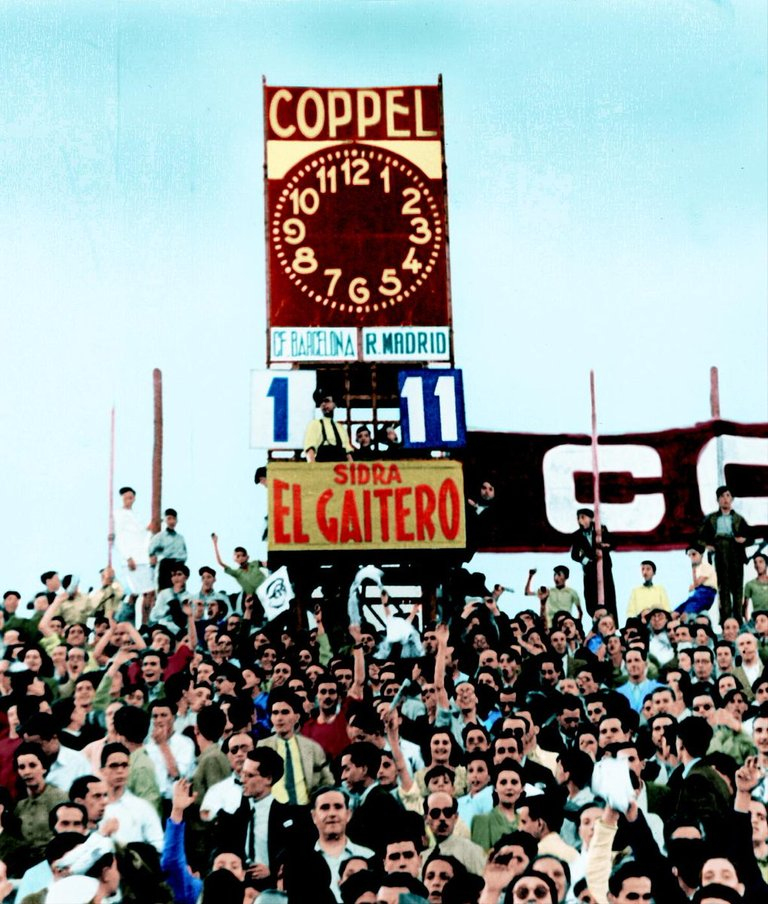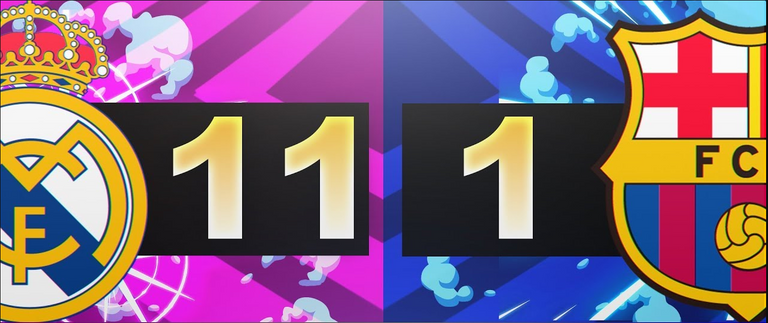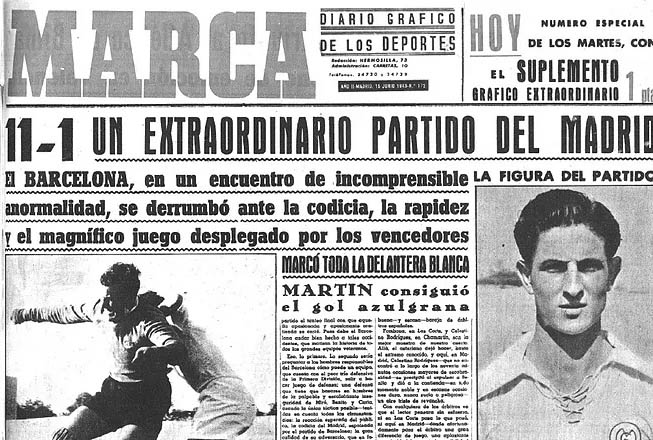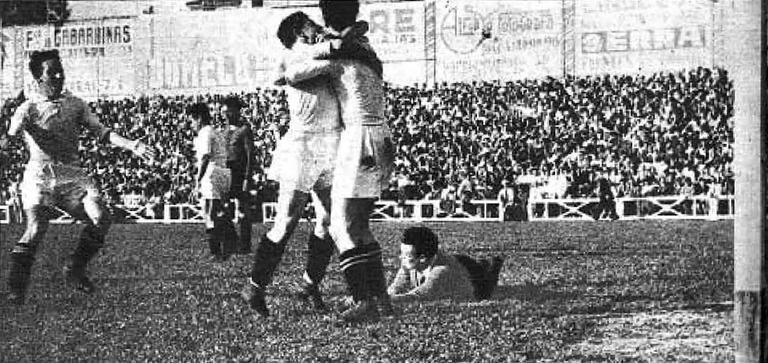
The political context of the time has led both Real Madrid and Barcelona to label this match as the 'match of shame'.
The history of the Clásicos has seen all kinds of episodes, from the great feats of the best players in history to unforgettable slaps on the wrists and even boring tributes to goalless football. However, it is striking that, buried among the things we no longer want to remember, there is little mention of the fact that the most emphatic result of the dozens of matches between Real Madrid and Barcelona that have taken place was the visit to Chamartín that ended 11-1.
"Real Madrid never boast about that game," explained Joan Barau, a journalist specialising in Barcelona's history, to Goal's microphone. "Basically because it wasn't a football match," he said. We are talking about a cup clash in June 1943. Barcelona had won the first leg 3-0 and had to hold out at the old Chamartín stadium to qualify for the final. "That Real Madrid turned the tie around is not surprising, the result is, which perfectly explains that it was more of a humiliation, a spectacle closer to what could be seen in a Roman circus than a football match".
The Les Corts stadium had received the Whites in a particularly hostile atmosphere, not forgetting that it was only four years since the end of the Civil War. "There was the Law of Political Responsibilities, according to which anyone who was not loyal to the principles of the regime was suspect," said Barau, who also noted that in the first leg, the Blue and Whites' fans "were heated by Real Madrid's rough play", an argument that many media used to "create such animosity towards Barcelona that the match was hardly played".

The match reached half-time with the scandalous score of 8-0. According to what the widow of the Blue and Whites' goalkeeper, Lluís Miró, told the journalist Xavier G. Luque, the white strikers kept pressing him as if the score was a goalless draw, to which Miró gave the ball to the rival, urging him to score, if they were so keen to take part in that public humiliation. The striker refused to finish off that gifted chance but it did not prevent the scoreline from being 11-1 at the end of ninety minutes, the highest in the history of the Clásico.
"It is remembered as the match of shame" explained Barau, "a result that Real Madrid has never brought up because it uncovers the worst ghosts of the darkest Spain" and takes the reader back to a harsh post-war era in which hunger was as present in the lives of Spaniards as the very censorship with which they would live for the next three decades. Football was their solace.
Legend has it that at half-time the Spanish army even intervened, making an appearance in the Barcelona dressing room. "It's a story that has never been proven and not a single one of the Barcelona players who were in that dressing room remains, but it's obvious that to score eleven goals you have to play against an absent opponent, because it's not usual in any case. There were warnings in the press in the days leading up to the game. "These warnings made some of the Barcelona players consider whether it was worth putting up resistance and they didn't".
Because "the match was much more than a mere sporting duel, it was about teaching a lesson and humiliating the club that represented like no other a totally different way of thinking, closer to the ideas of Catalanism". And despite the fact that Barcelona were used to all kinds of insults - Mingo Balmanya recalled how the fact that they were called "Catalan dogs" on many pitches was more of a motivation than anything else - "in that tie Barcelona were overcome by sheer fear in the face of military pressure and people close to the Falange who heated up the atmosphere". So that they can then say that football and politics have never been mixed in this country.

El contexto político de la época ha llevado tanto al Real Madrid como al Barcelona a calificar este partido como el «partido de la vergüenza».
La historia de los Clásicos ha vivido todo tipo de episodios, desde las grandes gestas de los mejores jugadores de la historia hasta inolvidables bofetadas e incluso aburridos homenajes al fútbol sin goles. Sin embargo, llama la atención que, enterrado entre las cosas que ya no queremos recordar, apenas se mencione el hecho de que el resultado más contundente de las decenas de partidos entre Real Madrid y Barcelona que se han disputado fue la visita a Chamartín que acabó 11-1.
«El Real Madrid nunca presume de aquel partido», explica al micrófono de Goal Joan Barau, periodista especializado en la historia del Barcelona. «Básicamente porque no fue un partido de fútbol. Hablamos de un choque de Copa en junio de 1943. El Barcelona había ganado 3-0 en la ida y tuvo que aguantar en el viejo estadio de Chamartín para clasificarse para la final. «Que el Real Madrid diera la vuelta a la eliminatoria no es sorprendente, el resultado sí, lo que explica perfectamente que fuera más una humillación, un espectáculo más cercano a lo que podría verse en un circo romano que a un partido de fútbol».
El estadio de Les Corts había recibido a los blancos en un ambiente especialmente hostil, sin olvidar que sólo habían pasado cuatro años desde el final de la Guerra Civil. «Existía la Ley de Responsabilidades Políticas, según la cual todo aquel que no fuera leal a los principios del régimen era sospechoso», señala Barau, que también apunta que en el partido de ida, la afición azulgrana “se calentó por el juego brusco del Real Madrid”, un argumento que muchos medios utilizaron para “crear tal animadversión hacia el Barcelona que el partido apenas se jugó”.
El partido llegó al descanso con el escandaloso marcador de 8-0. Según relató la viuda del portero azulgrana, Lluís Miró, al periodista Xavier G. Luque, los delanteros blancos siguieron presionándole como si el marcador fuera de empate a cero, a lo que Miró cedió el balón al rival, instándole a marcar, si es que tenían tantas ganas de participar en aquella humillación pública. El delantero no quiso rematar aquella ocasión regalada, pero ello no impidió que el marcador fuera de 11-1 al final de los noventa minutos, el más abultado de la historia del Clásico.

«Se recuerda como el partido de la vergüenza», explica Barau, “un resultado que el Real Madrid nunca ha sacado a relucir porque destapa los peores fantasmas de la España más oscura” y traslada al lector a una dura posguerra en la que el hambre estaba tan presente en la vida de los españoles como la propia censura con la que convivirían las tres décadas siguientes. El fútbol era su consuelo.
Cuenta la leyenda que en el descanso llegó a intervenir el ejército español, haciendo acto de presencia en el vestuario barcelonista. «Es una historia que nunca se ha demostrado y no queda ni uno solo de los jugadores del Barcelona que estuvieron en aquel vestuario, pero es obvio que para marcar once goles hay que jugar contra un rival ausente, porque no es lo habitual en ningún caso. Hubo advertencias en la prensa en los días previos al partido. «Estas advertencias hicieron que algunos jugadores del Barcelona se plantearan si merecía la pena oponer resistencia y no lo hicieron».
Porque «el partido era mucho más que un mero duelo deportivo, se trataba de dar una lección y humillar al club que representaba como ningún otro una forma de pensar totalmente diferente, más cercana a las ideas del catalanismo». Y a pesar de que el Barcelona estaba acostumbrado a todo tipo de insultos -Mingo Balmanya recordó cómo el hecho de que en muchos campos les llamaran «perros catalanes» fue más una motivación que otra cosa-, «en aquella eliminatoria al Barcelona le pudo el puro miedo ante la presión militar y de gente cercana a la Falange que caldeó el ambiente».Para que luego digan que el fútbol y la política nunca se han mezclado en este país.

Source images: Twitter La Liga.

